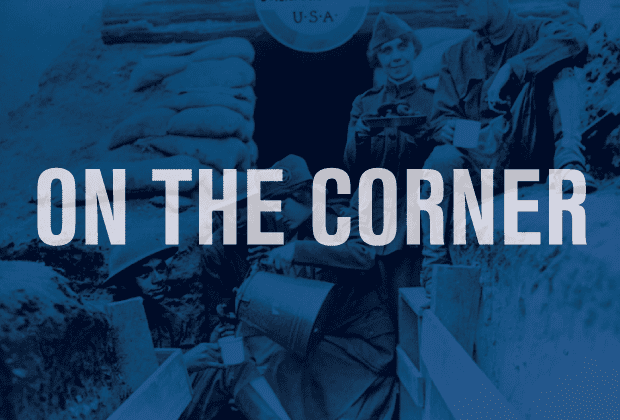Listen to this article
Listen to this article
Loading
Play
Pause
Options
0:00
-:--
1x
Playback Speed- 0.5
- 0.6
- 0.7
- 0.8
- 0.9
- 1
- 1.1
- 1.2
- 1.3
- 1.5
- 2
Audio Language
- English
- French
- German
- Italian
- Spanish
Open text
a bold booth builds an army. by bob docter –. yes, booth led boldly, but he let bramwell, one of his nine children, beat the drum. he seemed, always, to believe he was on the right track, in complete harmony with god’s will, certain of his goals and positive of the validity of his tactics. his enemy was the sin poverty creates and firmly believed in confronting the enemy of the “submerged tenth,” poverty, concurrent with working to save their souls. you take on the poverty first and then work to save the souls. william and catherine both took the offensive in criticizing those he considered to be “offenders.” more often than not, they were fellow clergymen, preaching what the booths believed to be ill prepared and lazy. they did not make many friends among this group, for they were blunt, honest and straightforward in their criticism. william’s formal education had ended at the fifth grade and catherine was held out of any school because of her mother’s fears that her morals would be undermined. the only book in the house, the bible, became her textbook. when in their mid-twenties they married. roy hattersley, in his book “blood and fire,” wrote that without catherine the army would have become very different, “as william booth, without her, would have been a different man.” he describes her as “one of the most extraordinary women of the nineteenth century.” both were dynamic preachers, strong leaders and courageous almost to a fault. with that courage they built an organization that would span the globe, and reach all continents. they met every challenge head on. their combination of social ministry and salvation took advantage of the rise of the industrial revolution. the timing must have been god ordained. england experienced a massive population shift from the fields to the cities. times were changing dramatically. the fields gave way to the city. workers flocked into urban areas and brought poverty and hunger with them. they needed different skills, some very dangerous, others highly complex to find employment. unemployment was massive. alcohol flowed generously, and the east end of london collected a massive number. the year 1890 was both painful and exciting. william and catherine had raised a large family, and both turned 61. they had grown with the industrial revolution. tragedy struck on october 4th, 1890, catherine received her promotion to glory. people deeply loved her and had prayed fervently for her. she had been ill for several months and her loss dampened significantly the intellectual analyses of the organization. she claimed victory in death. during her life she also had prevailed over many confrontations with the society and held audiences spellbound with her preaching. she won the battle relative to female ministry and full equality with men. pain permeated the people of london. in 1890 booth published “in darkest england and the way out.” he wrote:. “i have keenly felt the remedial measures usually enunciated by christian programs and ordinarily employed by christian philanthropy to be lamentably inadequate for any effectual dealing with the despairing miseries of these outcast classes. now, i propose to go straight for these sinking classes, and in doing so shall continue to aim at the heart. – if we help the man, it is in order that we may change him.”. booth explains the essence of his new approach for bringing the poor to a place that assists them to entertain the possibility of a new life. he does this through two points in “the cab horse charter.”. “the london cab horse is a very real illustration of poor, broken-down humanity: he usually falls down because of overwork or underfeeding. if you put him on his feet without altering his condition, it would only give him another dose of agony that requires you to pick him up again.”. that is the first point. when he falls down, you pick him up. second, “every cab horse in london has three things: (1) a shelter for the night, (2) food for its stomach, and (3) work allotted to it by which it can earn its corn.” he ties it carefully to an expression of christian love as the foundation for a new life. booth used his children and sent them all over the world to spread the gospel the army way. there were no age criteria for holding rank and responsibility for his children. eveline, who changed her name to evangeline, led canada at age 31. kate opened france in her twenties. ballington assumed command of the u.s. with his wife maud, in 1887 at 30. when william attempted to move them to australia in 1896, they resigned. evangeline led the army’s work in the u.s. from 1904-1934. the world today has grown significantly in a population that finds life much more complex and difficult than the problems of a london cab horse, and millions more people worldwide find themselves in many more categories of desperation. the army, all over the world, finds itself confronted by a wide array of cultures, beliefs and values. the army has assisted with supportive work in two world wars, has moved through several depressions and, today, it is more successful in ministering to the masses than ever before.
Open context player
Close context player
Plays:-Audio plays count
a bold booth builds an army. by bob docter –. yes, booth led boldly, but he let bramwell, one of his nine children, beat the drum. he seemed, always, to believe he was on the right track, in complete harmony with god’s will, certain of his goals and positive of the validity of his tactics. his enemy was the sin poverty creates and firmly believed in confronting the enemy of the “submerged tenth,” poverty, concurrent with working to save their souls. you take on the poverty first and then work to save the souls. william and catherine both took the offensive in criticizing those he considered to be “offenders.” more often than not, they were fellow clergymen, preaching what the booths believed to be ill prepared and lazy. they did not make many friends among this group, for they were blunt, honest and straightforward in their criticism. william’s formal education had ended at the fifth grade and catherine was held out of any school because of her mother’s fears that her morals would be undermined. the only book in the house, the bible, became her textbook. when in their mid-twenties they married. roy hattersley, in his book “blood and fire,” wrote that without catherine the army would have become very different, “as william booth, without her, would have been a different man.” he describes her as “one of the most extraordinary women of the nineteenth century.” both were dynamic preachers, strong leaders and courageous almost to a fault. with that courage they built an organization that would span the globe, and reach all continents. they met every challenge head on. their combination of social ministry and salvation took advantage of the rise of the industrial revolution. the timing must have been god ordained. england experienced a massive population shift from the fields to the cities. times were changing dramatically. the fields gave way to the city. workers flocked into urban areas and brought poverty and hunger with them. they needed different skills, some very dangerous, others highly complex to find employment. unemployment was massive. alcohol flowed generously, and the east end of london collected a massive number. the year 1890 was both painful and exciting. william and catherine had raised a large family, and both turned 61. they had grown with the industrial revolution. tragedy struck on october 4th, 1890, catherine received her promotion to glory. people deeply loved her and had prayed fervently for her. she had been ill for several months and her loss dampened significantly the intellectual analyses of the organization. she claimed victory in death. during her life she also had prevailed over many confrontations with the society and held audiences spellbound with her preaching. she won the battle relative to female ministry and full equality with men. pain permeated the people of london. in 1890 booth published “in darkest england and the way out.” he wrote:. “i have keenly felt the remedial measures usually enunciated by christian programs and ordinarily employed by christian philanthropy to be lamentably inadequate for any effectual dealing with the despairing miseries of these outcast classes. now, i propose to go straight for these sinking classes, and in doing so shall continue to aim at the heart. – if we help the man, it is in order that we may change him.”. booth explains the essence of his new approach for bringing the poor to a place that assists them to entertain the possibility of a new life. he does this through two points in “the cab horse charter.”. “the london cab horse is a very real illustration of poor, broken-down humanity: he usually falls down because of overwork or underfeeding. if you put him on his feet without altering his condition, it would only give him another dose of agony that requires you to pick him up again.”. that is the first point. when he falls down, you pick him up. second, “every cab horse in london has three things: (1) a shelter for the night, (2) food for its stomach, and (3) work allotted to it by which it can earn its corn.” he ties it carefully to an expression of christian love as the foundation for a new life. booth used his children and sent them all over the world to spread the gospel the army way. there were no age criteria for holding rank and responsibility for his children. eveline, who changed her name to evangeline, led canada at age 31. kate opened france in her twenties. ballington assumed command of the u.s. with his wife maud, in 1887 at 30. when william attempted to move them to australia in 1896, they resigned. evangeline led the army’s work in the u.s. from 1904-1934. the world today has grown significantly in a population that finds life much more complex and difficult than the problems of a london cab horse, and millions more people worldwide find themselves in many more categories of desperation. the army, all over the world, finds itself confronted by a wide array of cultures, beliefs and values. the army has assisted with supportive work in two world wars, has moved through several depressions and, today, it is more successful in ministering to the masses than ever before.
Listen to this article















